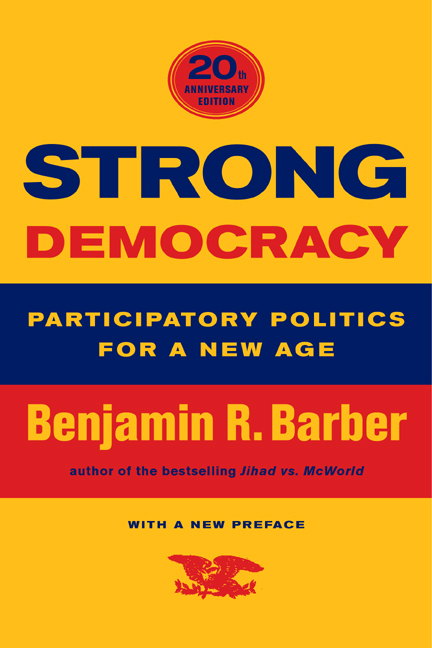Thick Democracy: In and Out of the Light
We would be well served by reading, or re-reading, Benjamin Barber’s Strong Democracy: Participatory Politics for a New Age. Yes, it is not a recent publication. That said, it’s as relevant as ever, perhaps even more so today than it was when first published nearly four decades ago.
Barber, who passed away in 2017, was a political scientist, a political theorist, and a scholar. He wrote important books, works that crossed the boundaries of academia into public discourse. Perhaps the best known is Jihad vs. McWorld, which grew out of an article for the Atlantic magazine. Barber was consistently interested in questions of democracy, human rights, and justice. No abstract idealist, Barber looked as those issues through the lens of power and economics.
Why Strong Democracy now? I recently learned of billionaire Jeff Bezos’s challenge to the team at the Washington Post shortly after he purchased the newspaper. He asked for a phrase that would make people want to buy a subscription. After multiple efforts, the tagline “Democracy Dies in Darkness” was proposed and adopted. I like the sound of it, but is it true? Light may be necessary, but is is enough? I would argue that there are many ailments attacking democracy and the absence of light is but one. The bright and shiny are not always healthy for us or for democratic values.
Barber’s book differentiates between “thin democracy” and “strong democracy.” Thin is about personal gain and personal profit. “Because liberal democracy makes an ideology of radical individualism, it depends heavily upon the idea of private property.” In other words, in thin democracy we think about ourselves, not the collective good. This comes with significant negative consequences. “Politics, more than nature, abhors a vacuum. Where citizens will not act, judges, bureaucrats, and finally thugs rush in.” Barber does not downplay the role of individual rights. He is committed. What he asserts, rightfully, I believe is that “individualism . . . has consistently underrated the human need for association, community, and species identification.” We have been increasingly living in that space. We want connection yet our society, our structures, our politics is about the individual. Lots of individual private goods do not necessarily make for a healthy public good.
Strong democracy, Barber asserts is about talking and listening to each other. It is grounded in “reasonableness” and the awareness that one’s perspective may not be as certain as one would like. If we listen to each other – truly listen – we will find ways to solve problems, get along, and help each other. “Good listeners may turn out to be bad lawyers, but they make adept citizens and excellent neighbors.”
Barber knows how to turn a great phrase. His prose is a joy to read.
The values advanced in Strong Democracy don’t support quick decisions by catch phrase or marketing tool. “By emphasizing the politics of common will and de-emphasizing the politics of brokered interests, strong democracy makes interaction, listening and common judgment the allies of civic and psychic integration.” Barber truly believes that “talk makes and remakes the world.” He is correct, if we can get out of our phones and away from our petty priorities, and decide to engage with with each other. If we do not, instead thinking only for ourselves and paying attention solely to those whose positions we already hold, society loses.
There’s an “expansive and generous understanding of citizenship – bound together by common interest” that emerges from Barber’s thinking. That’s hard to picture today, when our many media streams consistently harp and feed on dissent. However, it is still possible – if we take the time and we take care.
An optimistic message, to be sure, but it is one whose light still shows a path.
David Potash
